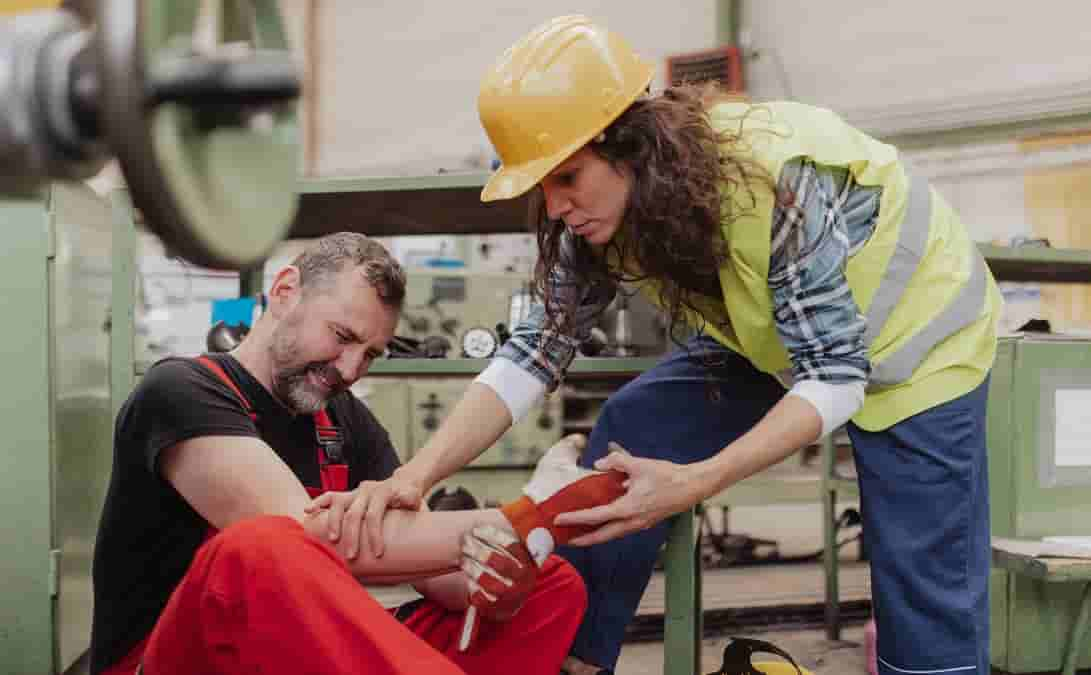What to do if you’ve been Injured at Work
Every day, hardworking people across the United Kingdom face unexpected accidents and injuries while doing their jobs. Whether it’s a manual handling injury, a fall, a machinery accident, or another type of workplace incident, being injured at work can cause physical, emotional, and financial strain. At The Workers Union, we believe no worker should face these challenges alone. Our goal is to ensure that employees receive fair treatment, accurate guidance, and the support they need following an injury at work.
Injury At Work
If you’ve suffered an injury at work, your immediate priority should be your health and safety. Always seek medical attention as soon as possible and make sure the incident is recorded in your employer’s accident book. This step creates a written record that may be vital if you later need to confirm how and when the accident occurred.
Next, inform your employer and, if possible, gather evidence—such as photographs of the accident site or witness statements. These actions can make a significant difference in ensuring your rights are protected.
At The Workers Union, we assist members in understanding their options and help ensure that injured workers are treated fairly by their employers.
Your rights as a UK employee
It is crucial to understand your rights as an employee in the UK. The law requires your employer to provide a safe and healthy working environment. This means that your employer must take steps to prevent work accidents and injuries from happening.

Common types of Injuries at Work
Injuries at work can occur in any environment—from offices to construction sites—and can range from minor cuts to serious or long-term conditions. Common examples include:
- Manual handling injuries caused by lifting, carrying, or moving heavy items without proper support or training
- Slips, trips, and falls on poorly maintained or cluttered floors
- Repetitive strain injuries (RSI) from repeated tasks or poor workstation setups
- Machinery or equipment accidents due to faulty tools or inadequate safety procedures
- Exposure to hazardous substances resulting in respiratory or skin conditions
If you’ve suffered any of these types of workers injuries, it’s important to seek guidance. Employers are required by law to maintain a safe working environment, and if they fail to do so, you have the right to raise concerns and request appropriate support.
Do I get full pay if injured at work in the UK?
One of the most common questions employees ask is, “Do I get full pay if I’m injured at work in the UK?” The answer depends on your employment contract and your company’s policies. In most cases, workers who are unable to work due to an injury may receive Statutory Sick Pay (SSP), which provides a basic level of income during your recovery period.
Some employers offer enhanced company sick pay or injury at work pay, which provides full or partial wages for a specified time. It’s crucial to check your employment contract or speak directly with your HR department to understand what you’re entitled to.
The Workers Union encourages employers to act with compassion and fairness when employees are recovering from workplace injuries. If you’re unsure about your rights to accident at work sick pay, we can provide support and help you understand what steps to take next.
Understanding injury at work pay
Injury at work pay can vary depending on the circumstances. If the accident was caused by employer negligence, you may be able to claim compensation for lost earnings, medical costs, and other related expenses. This process can help ensure you’re not left struggling financially while you recover.
Our organisation helps guide injured workers through the process of understanding their entitlements. Whether you’re uncertain about accident at work sick pay or need advice about returning to work safely, we’re here to support you.
How The Workers Union helps
Being injured at work can be a life-changing event. Beyond the physical pain, it can create anxiety about job security and finances. The Workers Union is committed to ensuring that every member who experiences an injury at work receives fair treatment, clear information, and strong advocacy.
We provide a trusted, supportive environment where workers can access expert advice, whether their injury involves manual handling, repetitive strain, or more serious incidents. Our team ensures that employers meet their legal obligations and that injured workers are given the time and resources they need to recover fully.

Protecting your rights and your future
Every worker deserves a safe workplace and fair treatment when accidents happen. By joining The Workers Union, you gain a dedicated ally focused on protecting your rights, helping you access your injury at work pay, and ensuring your recovery is respected.
If you’ve been injured at work, don’t face it alone—reach out today and let us help you get back on your feet with confidence.
Injury at work: Questions and answers
If you’ve been injured at work, your first priority should always be your health. Seek medical attention right away, even if the injury seems minor. Once safe, ensure that the incident is recorded in your workplace accident book and that your employer is informed. Having this record is essential, as it can be used to support any future claim or workplace safety review. If possible, gather evidence such as photos of the scene and details of any witnesses.
A common question among UK employees is, “Do I get full pay if I’m injured at work?” In most cases, workers will not automatically receive full pay unless their employment contract states otherwise. Many employers pay only Statutory Sick Pay (SSP), which is a government-set minimum amount for eligible employees who are too ill or injured to work.
However, some companies provide enhanced injury at work pay or company sick pay, which can offer full or partial wages during your recovery period. Always check your employment contract or speak to HR to understand your entitlement.
Statutory Sick Pay (SSP) is the legal minimum an employer must pay eligible workers who are unable to work due to illness or injury. As of 2025, SSP provides a weekly payment for up to 28 weeks, provided you meet the eligibility criteria. SSP starts after you’ve been off work for at least four consecutive days (including non-working days).
If your employer offers additional company sick pay, this may top up SSP or replace it entirely for a specific period.
Yes, you may be able to claim compensation if your injury at work resulted from employer negligence, unsafe working conditions, or a lack of proper training. Compensation can cover loss of earnings, medical expenses, travel costs, and in some cases, long-term care or rehabilitation needs.
The Workers Union can help guide you through the process of understanding your rights and options. It’s important to keep detailed records of your injury, medical treatment, and any correspondence with your employer.
Injuries at work can happen in almost any job role, but some are more common than others. Typical examples include:
- Manual handling injuries, such as back strains or sprains from lifting heavy objects
- Slips, trips, and falls, often due to unsafe flooring or spillages
- Repetitive strain injuries (RSI) from repetitive tasks or poor posture
- Machinery-related injuries, often resulting from inadequate safety measures
- Chemical exposure injuries, caused by contact with hazardous substances
Employers are legally responsible for ensuring that workplaces are safe and that all reasonable steps are taken to prevent such injuries.
Injury at work pay refers to any wages or compensation you receive when you’re unable to work due to a workplace injury. It may include Statutory Sick Pay (SSP), company sick pay, or additional compensation if your injury was caused by employer negligence.
Some employers have policies that guarantee full pay for a certain number of weeks, while others rely solely on SSP. The Workers Union helps ensure that members understand their rights and that they receive fair treatment and payment during recovery.
Accident at work sick pay is the income you receive when you’re unable to work following an accident at work. It may be SSP or an enhanced version offered by your employer. To qualify, you must inform your employer of the incident as soon as possible and provide medical evidence, such as a fit note, confirming your inability to work.
If you’re unsure about what pay you are entitled to after an accident at work, The Workers Union can assist you in understanding and asserting your rights.
It is unlawful for an employer to dismiss you simply for being injured at work or taking time off to recover. Employers have a legal duty to support injured employees and to make reasonable adjustments where needed. If you believe your employer has treated you unfairly following an accident, you should seek advice immediately.
The Workers Union provides members with guidance and information to ensure that they are protected from unfair treatment while recovering from a workplace injury.
The Workers Union stands alongside all UK workers who have been injured at work. Our mission is to ensure that workers are treated with fairness, respect, and dignity. We offer advice on workplace safety, sick pay rights, and recovery support, helping members navigate difficult situations with confidence.
We also promote safer working environments and push for better awareness of occupational health and safety standards across industries. Every worker deserves to feel safe at work—and supported if something goes wrong.
To report a workplace injury, follow these steps:
- Seek medical help immediately if required.
- Inform your supervisor or manager as soon as possible.
- Record the accident in the workplace accident book.
- Keep copies of all medical records and communications.
- If the injury is serious or involves long-term absence, you or your employer may need to report it under RIDDOR (Reporting of Injuries, Diseases and Dangerous Occurrences Regulations).
Keeping a clear record helps protect your rights and ensures accurate reporting for future reference.



